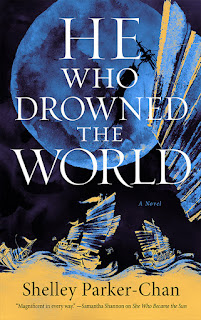Prince Elician is a Giver – a closely-guarded secret. He can heal any wound and bring the dead back to life. He also can’t be killed, so is cursed to watch his country wage an endless war. Reapers can kill with a single touch. And when one attacks Prince Elician near a hotly contested battlefield, the Reaper expects a terrible punishment. Instead, Elician offers him a new life on enemy territory.
Cat, as Elician calls him, hadn’t realized he could ever find someone who would make life worth living. Yet Elician’s enemies plan to turn his kindness against him. As the pieces of a deadly plot come together, tensions escalate at court and on the battlefield. The fires of conflict burst into new flame – but can those who wield the powers of life and death find peace?
"To heal a wound, you need to start small."
Lindsey Byrd's The Sun Blessed Prince is an excellent epic fantasy with a slow-burn achillean romance subplot. First in a duology, this book sets the stage for what promises to be an explosive conclusion by introducing a varied cast of characters, two realms at constant war, and two very different sets of beliefs based on the gods of Life and Death. Blessed by their respective gods, Cat and Elician are going to do their best to change things for the people in their realms.
Their relationship develops slowly. It's not too much of a spoiler to say that they're separated for most of the book, but their brief time together made an impression on both, and when they reunite they pick up from where they've left, changed forever by what occurred in the meantime. The final chapter is a very moving piece of writing, and almost brought me to tears.
Romance is decidedly not the focus. This is a great political fantasy with lots of moving pieces, twists (I spoiled myself on a big one by looking for the second book while still reading, but there's still so much more going on), and social commentary on slavery especially. There's a great focus on science, unexpected but fairly contained, and it worked well within the narrative. It's a big book with big themes and a list of trigger warnings one may want to check out before reading.
The trio of POVs is completed by Elician's young sister, a girl who’s grappling with her powers and with her place in the world. Her narration might feel out of place, but it provides much context, and her journey is one to pay attention too. The rest of the cast has its moments to shine, starting from Elician's devoted best friend.
My only gripe with this book and the only reason why I'm not giving it five stars is that the passage of a time in a certain portion of the book was unclear, and the same portion would have benefitted from a few more chapters with Elician's POV.
The Sun Blessed Prince is an incredible debut.
✨ 4.5 stars
🤴🏻☀ So you want to read about duty-bound princes?
Here's my review of Laura R. Samotin's The Sins on their Bones






























